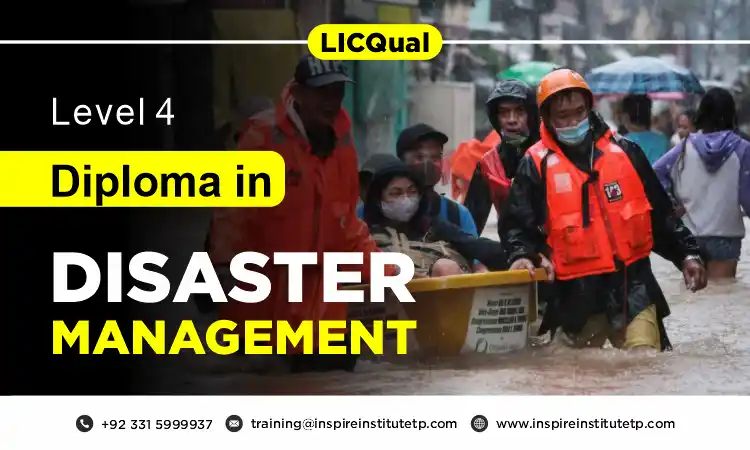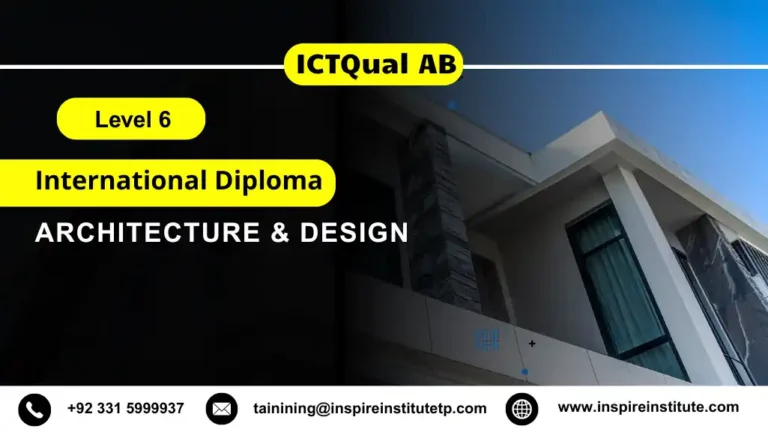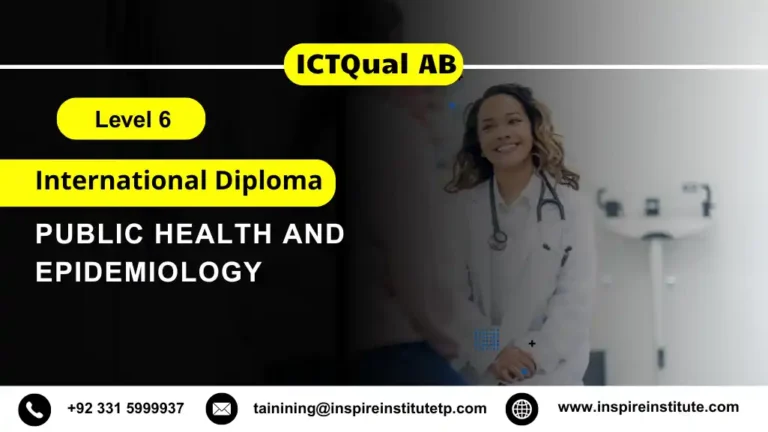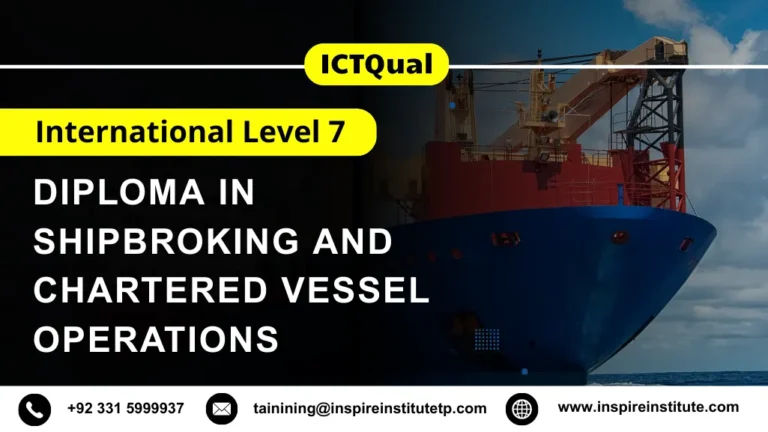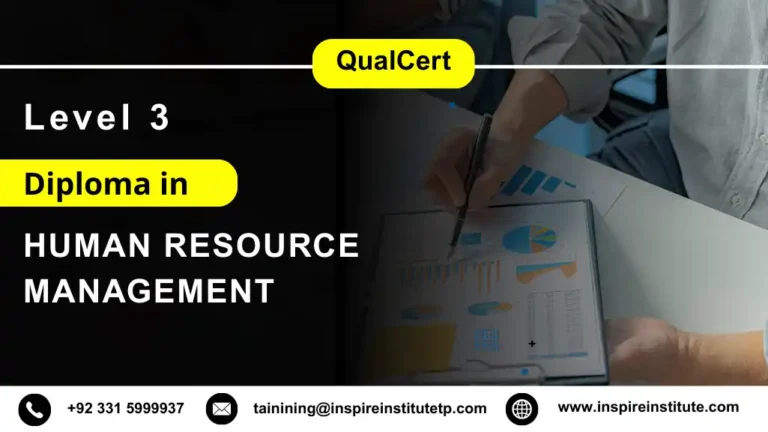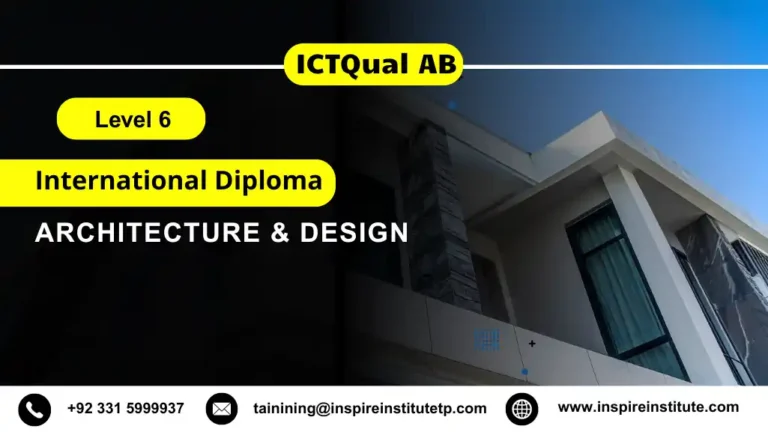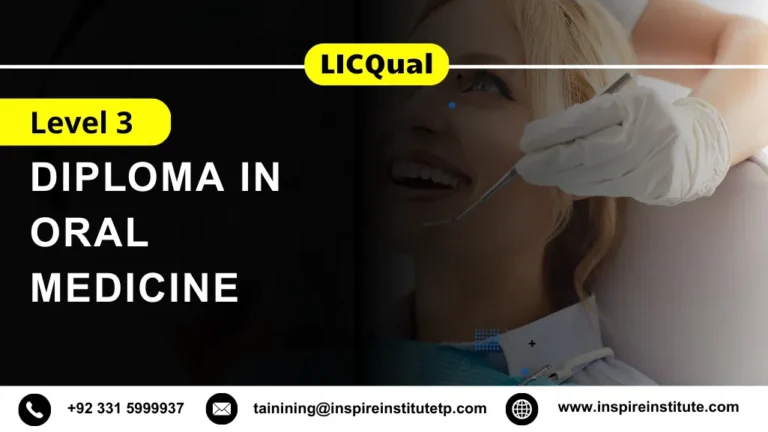LICQual Level 4 International Diploma in Disaster Management
This diploma is ideal for individuals seeking to advance their careers in disaster management, whether in government, NGOs, or the private sector, and is recognized for its practical focus and international relevance. Through this program, students gain critical expertise in managing complex disaster situations, making informed decisions, and leading effective crisis responses.
Why Choose this Qualification
Choosing the Level 4 International Diploma in Disaster Management offers several significant benefits:
- Comprehensive Curriculum:
This diploma covers all aspects of disaster management, including risk assessment, emergency planning, crisis response, recovery operations, and humanitarian logistics. It provides you with a deep understanding of the entire disaster lifecycle, from preparedness to recovery. - Career Advancement:
Ideal for those looking to step into leadership roles, the qualification enhances your ability to manage disaster response teams, coordinate relief efforts, and make strategic decisions in high-pressure situations. It opens doors to senior positions in government, NGOs, and international organizations. - Global Recognition:
The Level 5 Diploma is internationally recognized, making it highly valuable for those seeking career opportunities around the world. The qualification is respected by employers in the disaster management, humanitarian, and emergency services sectors. - Practical, Real-World Focus:
The program emphasizes practical skills, preparing you to apply disaster management theories to real-world situations. You’ll gain valuable hands-on experience in managing crises, responding to emergencies, and leading recovery efforts. - Flexible Study Options:
With online and part-time study options, you can pursue the qualification at your own pace, balancing your professional and personal commitments while advancing your career. - Growing Demand for Disaster Management Professionals:
As natural and man-made disasters become more frequent, the need for skilled disaster management professionals is rising. This qualification ensures you are prepared for a high-demand, rewarding career.
Course Overview
Ofqual Regulated Qualification
Course Level: Level 4
Average Completion Time:
4-12 Months
Study Units: 5 Units
Evidence & Assignment Based
Qualification Structure
The LICQual Level 4 International Diploma or Certification in Disaster Management comprises 5 mandatory units making a combined total of 100 credits, 1000 hours Total Qualification Time (TQT) and 500 Guided Learning Hours (GLH) for the completed qualification
Mandatory Units
Who Should Take This Course
The Level 4 International Diploma in Disaster Management is ideal for individuals who are passionate about making a difference in disaster response and recovery efforts. This course is suited for:
- Aspiring Disaster Management Professionals: Individuals seeking to enter the field of disaster management, humanitarian aid, or emergency response will benefit from the foundational knowledge and practical skills offered by this qualification.
- Current Professionals in Related Fields: Those already working in emergency services, environmental science, humanitarian organizations, or public health can enhance their expertise and expand their career opportunities by gaining a formal qualification in disaster management.
- Government and NGO Workers: This diploma is ideal for government officials, emergency planners, and NGO workers involved in disaster response, recovery, or risk reduction who want to deepen their understanding and improve their ability to manage crises effectively.
- Project Managers and Coordinators: Professionals responsible for coordinating disaster response or recovery efforts can gain valuable insights into risk assessment, resource management, and strategic planning, improving their ability to manage large-scale projects under pressure.
- Humanitarian Aid Volunteers: Volunteers looking to formalize their knowledge in disaster management and gain practical skills for more effective intervention in humanitarian crises will benefit from this course.
- Students and Graduates: Individuals with an academic background in fields like environmental science, international relations, or public health who are interested in pursuing a career in disaster management will find this qualification a strong addition to their credentials.
- Anyone Passionate About Disaster Relief: Individuals motivated by a desire to make a positive impact in disaster-affected communities and contribute to global resilience.
Course Benefits
Course Benefits of the Level 4 International Diploma in Disaster Management
- Comprehensive Knowledge: Gain a deep understanding of disaster management principles, including risk assessment, disaster response, recovery strategies, and mitigation techniques. Learn to navigate complex disaster scenarios with confidence.
- Practical Skills Development: Acquire hands-on skills in crisis communication, resource management, emergency planning, and strategic decision-making, which are essential for effective disaster response and recovery.
- Global Recognition: The qualification is internationally recognized, enhancing your credibility and employability in disaster management roles worldwide, across government agencies, NGOs, international organizations, and the private sector.
- Career Advancement: Open doors to new career opportunities and career progression within the disaster management, emergency response, and humanitarian aid sectors. The diploma equips you with the skills needed for higher-level roles.
- Expert-Led Learning: Learn from industry professionals with real-world experience, ensuring you are exposed to the latest trends, best practices, and global challenges in disaster management.
- Networking Opportunities: Connect with a network of professionals and peers from around the world, providing opportunities for collaboration, sharing knowledge, and career development.
- Flexible Learning: Many institutions offer flexible study options, allowing you to balance work and personal commitments while advancing your education.
- Positive Social Impact: The course prepares you to contribute meaningfully to disaster preparedness, response, and recovery, ultimately helping communities become more resilient in the face of disasters.
Eligibility Criteria
Educational Background:
A minimum of a high school diploma (or equivalent) is typically required.
Candidates with a background in fields like environmental science, social sciences, public health, or international relations may have an advantage but is not mandatory.
Professional Experience:
While prior experience in disaster management or related fields (e.g., emergency services, humanitarian aid, or risk management) is beneficial, it is not always a prerequisite.
Some institutions may consider applicants with relevant work experience or voluntary involvement in disaster-related activities.
Age Requirements:
Most institutions require candidates to be at least 18 years old at the time of enrollment.
Language Proficiency:
Proficiency in English (both written and spoken) is required, as the course is typically taught in English.
Non-native English speakers may need to provide proof of language proficiency through standardized tests like IELTS or TOEFL.
Commitment and Motivation:
Applicants should demonstrate a strong commitment to learning and an interest in pursuing a career in disaster management or related fields.
The Qualification Process
Here is a step-by-step guide to help you understand the entire journey from pre-registration to certification:
- Self-Assessment:
Begin by evaluating your eligibility for the course. Ensure you meet the entry requirements, such as relevant qualifications or professional experience, as outlined for the program. - Registration:
Complete your registration by submitting the required documents, including a scanned copy of a valid ID, and pay the necessary registration fee. This is your first official step in the qualification process. - Induction:
An assessor will conduct an induction session to verify your eligibility and introduce you to the evidence requirements. During this stage:- If the assessor finds that you meet all the necessary criteria, you will proceed to the next step.
- If you do not meet the entry requirements, your registration will be canceled, and your fee will be refunded.
- Evidence Submission:
Based on the assessment criteria, you will need to submit evidence demonstrating your knowledge and competence. Consult with your assessor if you need clarification on the type and nature of the evidence required. This evidence could include assignments, projects, case studies, or professional experiences related to sustainability management. - Feedback and Revision:
The assessor will review your submitted evidence and provide feedback. Evidence that meets the required criteria will be marked as “criteria met.” If there are any gaps, the assessor will highlight them, and you will need to address those gaps by revising and resubmitting the evidence. - Competence Evidence:
Submit your final evidence demonstrating that you have successfully achieved all the learning outcomes. The assessor will mark your submission as “Criteria met” once everything is up to standard. - Internal Quality Assurance (IQA):
After your evidence is approved by the assessor, the Internal Quality Assurance Verifier (IQA) will review it to ensure that the assessment was carried out consistently and according to LICQual standards. - External Verification:
The IQA then presents your portfolio to LICQual External Quality Assurance Verifiers (EQA) for final confirmation. The EQA may contact you directly to verify the authenticity of your evidence. - Certification:
Once all internal and external checks are completed to satisfaction LICQual will issue your official certificate, confirming that you have successfully achieved the qualification.
This comprehensive process ensures that learners demonstrate all necessary competencies and meet the high standards required for the Level 4 International Diploma in Disaster Management.

